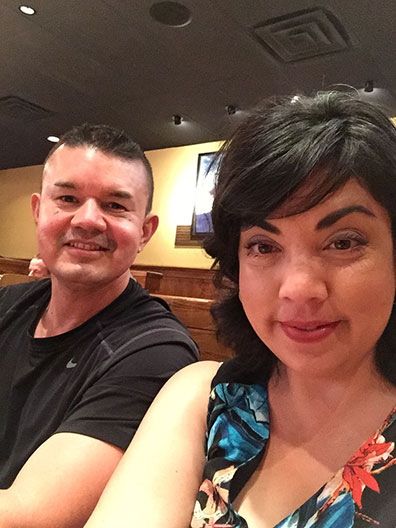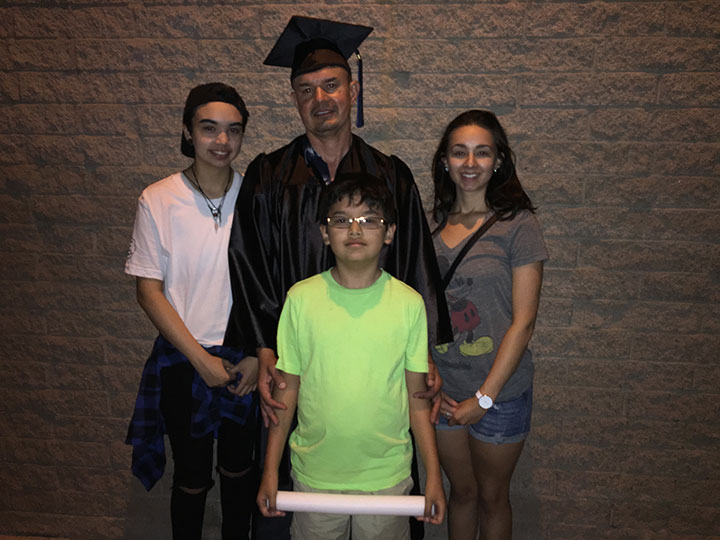National Disability Employment Awareness Month: With Help, Comes Hope for One DES Client
In 2009, at age 37, and, in what doctors call “superb” health, Gutierrez suffered an Ischemic Embolic stroke that affected the language area of his brain. He lost his words. He couldn’t recite the alphabet and didn’t understand what people were saying to him.
World Stroke Day
The American Stroke Association has designated Sunday, October 29 as World Stroke Day, with a focus on awareness of the causes of stroke, how to prevent stroke, spot the warning signs, and what action to take when one occurs and every second counts.
Some Fast Facts about Stroke:
- Stroke is the #2 cause of death worldwide
- One in six people will have a stroke in his or her lifetime.
- Someone has a stroke every two seconds
- Up to 80% of second clot-related strokes may be preventable*
*American Stroke Association
“I remember watching him and our [then] three-year old son, looking at flashcards to help improve for both their letter recognition, word recognition, colors, numbers, etc.,” said his wife, Dina Gutierrez. “My son was leading the activity for his dad. Visually, it was odd to me, as a mom and wife, but nonetheless, our reality now.”
Life as they knew it changed dramatically. Gutierrez had to quit his job at the City of Tucson, where he worked in environmental services. He had to stop working on his Bachelor of Religion degree, and his ministry with Southern Arizona churches ended. He went to rehabilitation and therapy twice a week—for three years--to regain his language skills and try to recover feeling in his right arm and hand.

It was hard work, but Gutierrez wasn’t done, and wasn’t giving up. He wanted to finish school, and continue on a career path. In 2012, three years after his stroke, Gutierrez was contacted by DES, about the Ticket to Work Program, which helps those who receive Social Security Disability Insurance re-enter the workforce. He was assigned a caseworker in the Division of Employment and Rehabilitation Services (DERS) and found out he also qualified for the Vocational Rehabilitation Program. His caseworker, Leshan Mitchell, knew they had a lot of work to do. Gutierrez still struggled with speech and comprehension; memory; focus and concentration. He often confused numbers and it took him a long time to process them. Every task required more planning, time management and self-monitoring.

VR assisted Gutierrez with speech therapy, tuition and textbooks, and gave him the tools he needed to enroll again in school and get through his classes. With the help of VR, Gutierrez received a new laptop with an external keyboard and monitor. He received a noise-cancelling headset; speech recognition software and a smart pen that records classroom lectures, and transfers anything he writes right onto his computer.
“I’m glad that I do have these tools, or else it would be tougher for me to follow along,” said Gutierrez.
He started slow, taking one class at a time at Pima Community College. He’ll graduate next month with a Bachelor of Social Science degree from Wayland Baptist University.
“He has definitely come a long way,” said Mitchell. “He has been dedicated to the perseverance of completing college in order to achieve successful employment.”
Dina Gutierrez—wife, mother and now, head of household and caretaker—couldn’t be more proud of the work her husband has done, and what he’s accomplished despite his limitations.
“We consider ourselves blessed to have been given his education to obtain his bachelor’s,” said Dina. “It's helped our family of five move forward. It was a huge financial help as we got back on our feet creating a post-stroke life. But what I am most proud and thankful for is that it allowed Gabriel to continue his education where he left off in 2009.”
Gabriel Gutierrez plans to continue on, and earn a master’s degree, and eventually work in social services. He’s still a VR client, and caseworker Leshan Mitchell anticipates they’ll be able to help Gutierrez through the Job Development and Placement services.
October is National Disability Employment Awareness Month. DES offers several programs to assist job seekers with disabilities.
The Vocational Rehabilitation (VR) program supports job seekers with disabilities in reaching their employment goals. Job seekers with mental (including mental illness and learning disabilities) or physical impairments may qualify for VR assistance. To learn more about the VR services available to job seekers though, please visit our VR webpage.
The Business Enterprise Program (BEP) supports visually impaired entrepreneurs in the VR program to operate their own merchandising businesses under Federal and State agency management. To learn more about BEP, please visit our BEP webpage.
The Ticket to Work (TTW) program supports individuals, ages 16-64, who receive Social Security Disability Insurance (SSDI) or Supplemental Security Income (SSI) benefits and want to enter or re-enter the workforce. To learn more about the TTW program, please watch the Meet Ben! video or visit our TTW webpage.
The Transition School to Work program (TSW) is designed to assist students who have disabilities prepare for employment. DES VR counselors collaborate with school social workers to ensure that students are supported before and after graduation. For more information about the TSW program, please watch our TSW overview video or visit our VR webpage.
For more information about programs DES employment services for individuals with disabilities, please visit our Rehabilitation Services Administration webpage.
By Connie Weber

